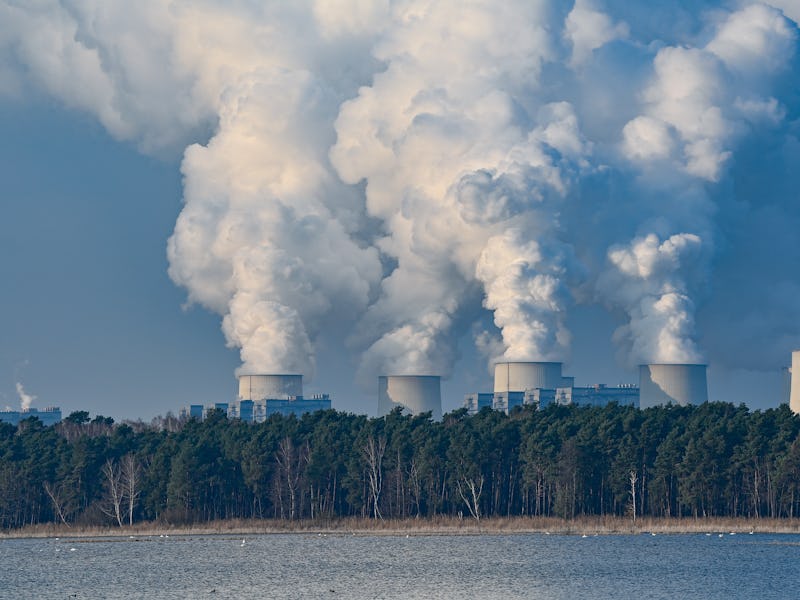Climate change is making us sick
"We're in the moment where we can act, and we have the tools to do it."

The year 2020 is one of cascading crises — a pandemic and subsequent economic fallout, all against a backdrop of political instability and a societal reckoning over racial injustice.
In the fifth-annual "Climate Countdown" report by The Lancet, scientists report the "most concerning outlook for human health" in 20 years.
Lead author Renee Salas, an emergency medicine physician and researcher at Massachusetts General Hospital, tells Inverse: "We are bound together in a common fate."
"Climate change is impacting and harming us now, and it will only get worse if we don't act now."
The report, representing the findings and consensus of 35 leading academic institutions and UN agencies, makes clear that climate crisis-health issues, are becoming the norm.
But it's not all bad news. The report argues that now is the time to address the pandemic and the climate crisis in tandem — if we are strategic, nimble, and intentional with resources.
Beyond Band-Aid solutions — Annually, one million people die due to air pollution exposure from coal-fired power, an issue Salas sees first hand in her medical practice.
"In my emergency department, I often feel like I'm putting a bandaid on a bullet wound," Salas says. A patient will come in with an asthma attack, and Salas can effectively treat their disease at that moment and open up their lung passageways.
"But then I send them back out into the world where air pollution, which is created from the combustion of fossil fuels, and is also driving climate change, is worsening their disease," Salas explains.
"I often feel like I'm putting a Band-Aid on a bullet wound."
It also shows that five years after the landmark Paris Agreement, progress is not being made. Despite "clear and escalating signs," global carbon dioxide emissions continue to rise steadily, with no convincing or sustained abatement, the team writes. The world, in turn, has heated by a global average temperature of 1 to 2 degrees Celsius. The five hottest years on record have occurred since 2015.
On this hotter planet, life has gotten harder and less livable. In 2018, 296,000 people died because of overwhelming heat. Meanwhile, heat is increasingly threatening the ability to work outdoors in developing regions. In 2019, there were 302 billion potential work hours lost, with countries like India and Indonesia hardest hit.
"Climate change is touching everything, not only our health but the way in which we live and work," Salas says.
Globally, the last two decades have seen a 54 percent increase in heat-related deaths in older people, with a record 2.9 billion additional days of heatwave exposure affecting people over the age of 65 in 2019 – almost twice the previous high.
The climate crisis isn't bound to high-polluters or poorer nations. Sixty-seven percent of cities around the world surveyed in the report expect climate change to seriously compromise their public health assets and infrastructure.
Looking toward the future, based on current populations, between 145 million people and 565 million people could be displaced from their homes due to rising sea levels, the report states.
Coronavirus and climate change — While the 2020 Climate Countdown's numbers are grim, Salas is confident it is possible to mitigate these dire projections.
Luckily, the solutions to the climate crisis aren't unclear or mysterious. We know what needs to be done — reduce global warming to 1.5 degrees of warming.
"There's nothing harder for me than a patient that I don't have a treatment for — but we have the treatments that we need," Salas says. "All we need to do is have the will in which to carry them out."
When human health is on the line, as we've seen in the pandemic, institutions come together in unprecedented ways to rapidly adapt, Salas explains. We can do the same with climate change.
"Climate change may be playing out on a slower scale, but the same underlying parallels [with Covid-19] exist — that if we don't act on the science, and we delay our action, have inequitable action or none at all, people get sick and die," Salas says.
"We can learn from this moment, rise from the ashes, and recognize that we do not want to have this type of experience repeated."
Facing the future — To move forward and address these convergent crises, policymakers need to integrate a climate lens into Covid-19 recovery plans and stimulus packages — at the federal, state, and city levels. There's a "once in a generation" opportunity to invest in renewable energy and away from fossil fuels, Salas says.
On an individual level, people should discuss climate change as a health crisis, that affects their loved ones and themselves, Salas suggests. And understand that living sustainably — walking or biking to work or eating more plants — benefits health as well as the environment.
Ultimately, in the fight against the novel coronavirus or climate change, we're in it together.
"Just as we've seen the pandemic unfold globally, showing that no country is spared and the virus does not respect country borders, greenhouse gases do not respect country borders," Salas. "So what happens in one country influences someone halfway around the world."
"We can't undo what has happened in the past," Salas says. "But we have a profound opportunity in this moment, to change our path. But we can only do it if we all do it together."